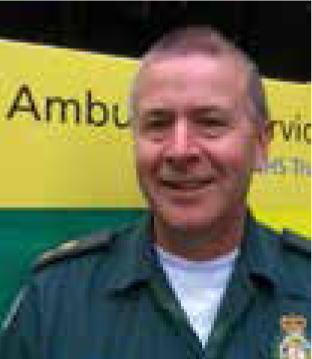
Q. How do you feel paramedic practice has evolved over the last 10 years?
A. I think it's evolved from being a very ambulance-centric activity. Now in 2018, we've got paramedics in urgent care centres, GP surgeries, cruise ships, leisure parks. The drug therapy range has extended, the autonomy that paramedics have to make decisions based on what's in front of them has extended, and giving paramedics additional training in the area of urgent care is another area which is currently extended. We are moving away from the jack of all trades and master of none, and I think the profession seems to be diversifying in a way that people are becoming specialists in their areas of interest and taking their level of education in that particular area further.
Q. What have been the major developments in training and education?
A. The major change has been a shifting emphasis from the vocational route to the higher education route. It gives people the opportunity who didn't do a higher education course, to progress along a series of modules to help them gain a BSc, and to join the higher echelons of the profession in research or leadership, educational and clinical.
In 2008, the aspiring paramedic would have done a modular programme on the clinical and anatomical aspects of practice but that didn't address the professional behaviour of paramedics. Now, it introduces the ability to read clinical audit research and interpret it, the ability to understand law and ethics, to understand a better health promotion and those kinds of skills that have haven't previously been in the programme. It was felt certainly within the London Ambulance Service and across the UK that it was wrong to ask people to sign up to a professional set of values, without having given them some underpinning knowledge and education in what those values meant in real life.
Within the UK, there is also the development of an apprenticeship pathway which recognises the practical nature of paramedic work, where they are learning as they go, and learning the underpinning theories. And the contemporary big news, if you like, is the increase of technology enhanced learning which includes e-learning and interactive modules, and also an increased use of simulation in training.
Q. How has the London Ambulance Service changed and what developments do you see taking place in future?
A. With increasing demand, there has been more emphasis on the use of alternative care, community care and referral care pathways. There is also an increased emphasis on hear and treat. It's a different way of managing the demand and it's also a different way of our paramedics practising and operating.
Crews have an iPad, so they use mobile technology wherever they are to find out where the nearest appropriate treatment centre is. Within that iPad, they've also got the referral guidelines and the clinical guidelines application, which will help them to make decisions. We also have what we call pioneer services, the areas of maternity care, mental health care, urgent care, end-of-life care and falls. We are trying match our skill sets and education to patient groups that we intend to serve.
Q. What role do you feel the Journal of Paramedic Practice has played?
A. The role it plays is to provide some very good academically-based peer-researched articles, which evolves thinking within the profession. I think it provides some excellent quality CPD, and I think the fact that the CPD in the articles within the journal are linked, is also helpful. Certainly my experience of it is, I have found it a useful journal.
Q. What do you see unfolding in practice, research, education and leadership?
A. The base level of education for the profession will be BSc. So in 5 years' time, we will be looking at an entirely degree-led profession, which I think is the right thing to be doing. I would say independent prescribing by paramedics will be routine and commonplace. I think ongoing education and career development will take place over a series of different work placements and those placements will form part of a rotation. I think as a profession we are getting better at working across professional boundaries and sharing practice and understanding. I think the education longer-term has to become more holistic in order to reflect the rotational model.
Q. How prepared are paramedics for their increased autonomy in decision-making?
A. The paramedics who have extended skill sets and specialist education are better prepared. I think there is still a little way to go in terms of preparing the vast majority of paramedics; the capabilities and tools are there, but there is a general nervousness about using these tools and exercising that autonomy. We've got paramedics who thrive on it, but the majority of us need some time to get comfortable. You can't teach people experience, and experience and education will go hand in hand.

